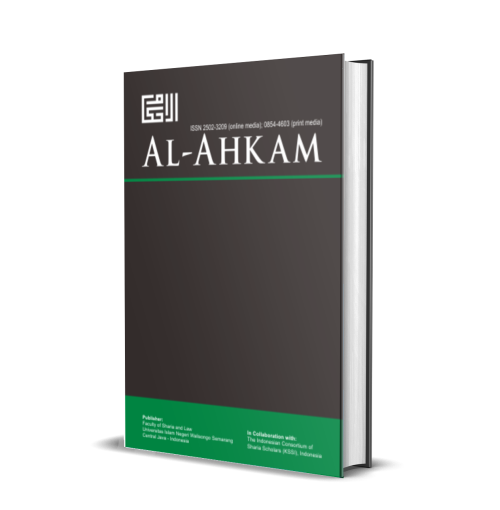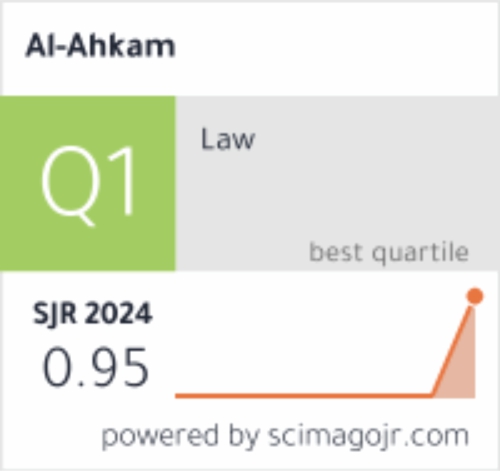Children Citizenship Status of Acehnese-Rohingya Mixed Marriage in Aceh: Maqāṣid Sharī’ah Perspective
DOI:
https://doi.org/10.21580/ahkam.2024.34.1.20162Keywords:
Acehnese, dual citizenship, habitual residence, maqāṣid sharī’ah, RohingyaAbstract
Citizenship status is important in mixed-country marriages. This research explores the important issue of citizenship in mixed marriages between Rohingya refugees and local Acehnese. The research aims to examine whether the citizenship status of the children of such marriages is based on the doctrine of revival or habitual residence. Using a literature review method with a descriptive qualitative approach, this research investigates the concepts and legal implications surrounding citizenship status in such marriages. The findings of this study reveal that the citizenship status of children born from Acehnese-Rohingya marriages follows habitual residence, even though their Rohingya parents adhere to the doctrine of revival The legal status of these children is subject to the Indonesian marriage law system. This is in line with Jasser Auda’s concept of maqāṣid sharī’ah because it prioritizes aspects of the benefit of these children. This research provides important insights into the issue of citizenship In Acehnese-Rohingya marriages and offers valuable meaning for understanding the dynamics of citizenship in these marriages.
Downloads
References
Aji, Koesmoyo Ponco, M. Alvi Syahrin, Anindito Rizki Wiraputra, and Teguh Prasetyo. ‘Dual Citizenship in Indonesia from the Perspective of Dignified Justice and Sovereignty’. Law and Humanities Quarterly Reviews 3, no. 1 (2024). https://doi.org/10.31014/aior.1996.03.01.100.
Auda, Jasser. Maqasid Al-Shari’ah as Philosophy of Islamic Law: A Systems Approach. Herndon: The International Institute of Islamic Thought, 2010.
Breuning, Marijke, and John Ishiyama. ‘The Politics of Intercountry Adoption: Explaining Variation in the Legal Requirements of Sub-Saharan African Countries’. Perspectives on Politics 7, no. 1 (2009): 89–101. https://doi.org/10.1017/S1537592709090124.
Collier, John, and Vaughan Lowe. ‘Statute of the International Court of Justice’. In The Settlement of Disputes In International Law, 346–58. Oxford: Oxford University Press, 1999. https://doi.org/10.1093/oso/9780198256694.005.0006.
Devaney, James Gerard. ‘The Role of Precedent in the Jurisprudence of the International Court of Justice: A Constructive Interpretation’. Leiden Journal of International Law 35, no. 3 (2022): 641–59. https://doi.org/10.1017/S092215652200022X.
Dragišić, Radmila. ‘The Concept of Habitual Residence in Selected Sources of EU Private International Law and Jurisprudence of the Court of Justice of the European Union: Functional Approach versus Strict Textualism’. Zbornik Radova Pravnog Fakulteta Nis 61, no. 94 (2022): 137–51. https://doi.org/10.5937/zrpfn1-37590.
Garbolino, Hon. James D. The 1980 Hague Convention on the Civil Aspects of International Child Abduction: A Guide for Judge. Washington D.C: Federal Judicial Center, 2015.
Hamid, Abdul Ghafur. ‘Determination of a Child’s Habitual Residence in International Child Abduction Cases: Charting the Way towards Harmonization’. IIUM Law Journal 28, no. 2 (2020): 481–501. https://doi.org/10.31436/iiumlj.v28i2.575.
Hathaway, James C., and Michelle Foster. The Law of Refugee Status. Cambridge: Cambridge University Press, 2014. https://doi.org/10.1017/CBO9780511998300.
Honorati, Costanza. ‘Protecting Mothers against Domestic Violence in the Context of International Child Abduction: Between Golan v Saada and Brussels II-Ter EU Regulation’. Laws 12, no. 5 (2023): 79. https://doi.org/10.3390/laws12050079.
Ichwan, Moch Nur, Arskal Salim, and Eka Srimulyani. ‘Islam and Dormant Citizenship: Soft Religious Ethno-Nationalism and Minorities in Aceh, Indonesia’. Islam and Christian–Muslim Relations 31, no. 2 (2020): 215–40. https://doi.org/10.1080/09596410.2020.1780407.
Kementerian Luar Negeri Republik Indonesia. ‘Perkawinan Campuran di Indonesia’. Kedutaan Besar Republik Indonesia di Brussel Belgia, 2021. https://www.kemlu.go.id/brussels/id/pages/pernikahan_di_indonesia/4426/etc-menu.
Korfali, Deniz Karci, and Deniz Şenol Sert. ‘Türkiye’de Çifte Vatandaşlık-Entegrasyon İlişkisini Tartışmak’. Uluslararası İlişkiler Dergisi 16, no. 64 (2019): 93–106. https://doi.org/10.33458/uidergisi.652960.
Kruger, Thalia. Civil Jurisdiction Rules of the Eu and Their Impact on Third States. Oxford: Oxford University Press, 2008. https://doi.org/10.1093/oso/9780199228577.001.0001.
Marshall, T. H., and Tom Bottomore. Citizenship and Social Class. Pluto Press, 2015. https://doi.org/10.2307/j.ctt18mvns1.
Martín, Lucas Andrés Pérez. ‘The Habitual Residence of the Spouses in European Matrimonial Property Crises, Episode 1: Even with Life between Several States, There Is Only One Habitual Residence’. Cuadernos de Derecho Transnacional 14, no. 1 (2022): 422–43. https://doi.org/10.20318/cdt.2022.6692.
Masriadi, M. ‘Warga Rohingya Ikut Nikah Massal di Aceh’. kompas.com, August 30, 2015. https://megapolitan.kompas.com/read/2015/08/30/16305311/Warga.Rohingya.Ikut.Nikah.Massal.di.Aceh.
McDonald, Morgan. ‘Home Sweet Home? Determining Habitual Residence Within the Meaning of the Hague Convention’. Boston College Law Review 59, no. 9 (2018). https://lira.bc.edu/work/sc/51b01829-5c4f-4d07-8f1b-96c5a53e1d63.
Muhaimin, Muhaimin, and Abd Wahab. ‘Futurologi Undang-Undang Pemilu di Indonesia Perspektif Maqāṣid Sharī’ah’. Islamica: Jurnal Studi Keislaman 13, no. 2 (2019): 279–304. https://doi.org/10.15642/islamica.2019.13.2.279-304.
Murtadlo, Muhammad Ali. ‘Analisis Maqasid Syariah Jasser Auda terhadap Counter Legal Draft Kompilasi Hukum Islam’. al-Syakhsiyyah: Journal of Law & Family Studies 3, no. 2 (2021). https://doi.org/10.21154/syakhsiyyah.v3i2.3118.
Muslim, J. M., Nanda Humairatuzzahrah, and Suci Ratnawati. ‘Habitual Residence on Children Victims of Divorce in Mixed Marriage: Maslahah Mursalah Perspective’. In Proceedings of the 4th International Colloquium on Interdisciplinary Islamic Studies in Conjunction with the 1st International Conference on Education, Science, Technology, Indonesian and Islamic Studies, ICIIS and ICESTIIS 2021, 20-21 October 2021, Jambi. EAI, 2022. https://doi.org/10.4108/eai.20-10-2021.2316346.
Nhlapo, Thandabantu. ‘Customary Marriage: Missteps Threaten the Constitutional Ideal of Common Citizenship’. Journal of Southern African Studies 47, no. 2 (2021): 273–89. https://doi.org/10.1080/03057070.2021.1880750.
Nurhidayati, Andriyah, Agus Sudargono, and Pranichayudha Rohsulina. ‘Application of Snowball Throwing to Improve the Learning Outcomes of Social Science (IPS) Geography of Students in Grade VIII C Muhammadiyah 1 Junior High School Sukoharjo in the Academic Year 2017/2018’. Journal of Geography Science and Education 1, no. 1 (2019): 1–15. https://doi.org/10.32585/jgse.v1i1.269.
Puspitawati, Dhiana, and Fransiska Ayulistya Susanto. ‘Protection People at Sea under International Law: How We Could Learn from Pushback Action to Boat People from Indonesia and Malaysia?’ Brawijaya Law Journal 10, no. 2 (2023). https://doi.org/10.21776/ub.blj.2023.010.02.02.
Rodríguez, Mercedes Sabido. ‘Habitual Residence as a Forum for International Jurisdiction in Some Areas of International Family Law’. Cuadernos de Derecho Transnacional 15, no. 2 (2023): 1324–42. https://doi.org/10.20318/cdt.2023.8109.
Rumiartha, I. Nyoman Prabu Buana, and I. Gusti Agung Mas Rwa Jayantiari. ‘Fulfilling Right to Education for Rohingya Refugee Children in Indonesia’. The Age of Human Rights Journal, no. 21 (2023): e7659. https://doi.org/10.17561/tahrj.v21.7659.
Smith, Claire Q., and Susannah G. Williams. ‘Why Indonesia Adopted “Quiet Diplomacy” over R2P in the Rohingya Crisis: The Roles of Islamic Humanitarianism, Civil-Military Relations, and ASEAN’. Global Responsibility to Protect 13, no. 2–3 (2021): 158–85. https://doi.org/10.1163/1875-984X-13020004.
Stanivuković, Maja. ‘Child’s Habitual Residence in the Jurisprudence of the Court of Justice of the European Union’. Zbornik Radova Pravnog Fakulteta, Novi Sad 55, no. 4 (2021): 709–35. https://doi.org/10.5937/zrpfns55-34676.
Syafrizal, S. ‘Akibat Hukum Perkawinan Campuran antar Negara WNI dengan WNA terhadap Status Personal Anak’. Warta Dharmawangsa 17, no. 3 (2023): 1069–80. https://jurnal.dharmawangsa.ac.id/index.php/juwarta/article/view/3410.
Syarif Hidayattullah. ‘Respon Negara terhadap Pencari Suaka di Indonesia (Studi Kasus Pengungsi Rohingya di Aceh Pasca Reformasi)’. Undergraduate Thesis. Universitas Islam Negeri Prof. K.H. Saifuddin Zuhri Purwokerto, 2022.
Takdir, Muh., and Surastini Fitriasih. ‘Indonesia’s Criminal Law Policy in Tackling Cyberbullying with a Restorative Justice Approach’. Legal Brief 11, no. 6 (2023): 3650–58. https://doi.org/10.35335/legal.v11i6.733.
Turner, Bryan S. ‘Outline of a Theory of Citizenship’. In New Critical Writings in Political Sociology: Volume Two: Conventional and Contentious Politics, 2017. https://doi.org/10.4324/9781003023586-2.
Wesna, Putu Ayu Sriasih, and Josephine Carene Andrea. ‘Inheritance Rights to Freehold Land for Children with Dual Citizenship Outside of Mixed Marriage’. International Journal of Multidisciplinary Research and Analysis 6, no. 7 (2023): 3373–81. https://doi.org/10.47191/ijmra/v6-i7-68.
Zombory, Katarzyna. ‘Protecting the Child’s Best Interest in International Parental Abduction of Children: Mediation in the 1980 Hague Convention Cases’. Prawo w Działaniu 54 (2023): 217–37. https://doi.org/10.32041/pwd.5408.
Downloads
Published
How to Cite
Issue
Section
License
By submitting an article to the journal, the author(s) agree to transfer the published article's copyright to the journal, which will act as the publisher. This means the journal will have the right to publish the article in various forms, including reprints. The journal will maintain the publishing rights to the published articles.
In line with the license, authors and third parties (readers, researchers, and others) are allowed to share and adapt the material. In addition, the material must be given appropriate credit, provided with a link to the license, and indicated if changes were made. If authors remix, transform or build upon the material, authors must distribute their contributions under the same license as the original.



